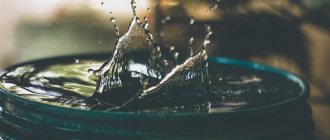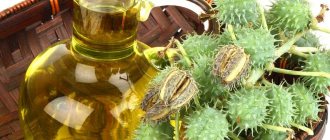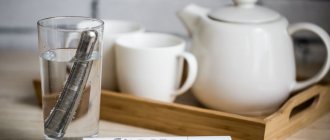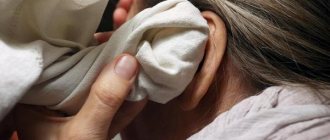March 30, 2021 April 14, 2021
- How water affects your health Dehydration
- Excessive fluid intake
- How much water to drink per day?
- During pregnancy
Water is the basis of our life. As you know, a person cannot live more than four days without water, and the loss of only 1% of fluid by the body causes thirst. Our health, the condition of the epidermis and hair, and the well-being of a person as a whole depend on the amount of water we drink. The percentage of water in the human body varies depending on age. So, a newborn consists of 90% water. But with age, the amount of fluid decreases, and by old age the percentage of its content in the body decreases to 60%. Unfortunately, it is impossible to stop this process completely. However, it is within our power to adhere to the drinking regime and maintain the correct water balance for as long as possible, prolonging our lives and maintaining health.
How water affects health
Water is involved in all biochemical processes of the body, such as:
- metabolism,
- digestion,
- hematopoiesis,
- regulation of blood pressure,
- thermoregulation,
- removal of toxins.
Disruption of these processes affects the condition of hair, skin, nails, as well as the functioning of all body systems, the musculoskeletal system, and the brain. No wonder doctors believe that dehydration can cause confusion and headaches. After all, the human brain is 75% fluid. It's the same with blood. The less water in our body, the thicker the blood and the higher the pressure. That is why hypertensive patients need to monitor their water balance especially carefully. When the body feels a lack of water, it begins to intensively produce histamine, a hormone responsible for the immune response in a situation that is alarming for the body. However, an excess of histamine activates not only the immune system, but also allergies. This is why maintaining a drinking regime for allergy sufferers is especially important. Water dissolves and delivers a variety of nutrients to tissues. Without water, normal functioning of joints and muscles is impossible. With its deficiency, the likelihood of arthrosis and osteochondrosis sharply increases due to the constant wear and tear of fragile cartilage tissue. People suffering from diabetes must control their blood sugar. Drinking a glass of water instead of juice or a sugary drink helps them keep their sugar levels under control. While drinks containing sugar can cause a sharp rise in its level in the blood and increase thirst.
Dehydration
When dehydrated, the body draws water from cells to maintain its most important functions. As a result, cell functionality is impaired. The blood thickens and moves more slowly, and accordingly, oxygen arrives with delays.
Signs that indicate you are not drinking enough water:
- feeling of thirst and dry mouth;
- dark yellow urine;
- peeling of the skin, cracks on it;
- headache;
- drowsiness and lethargy;
- cardiopalmus.
Unfortunately, at the very beginning, these signs may appear separately, not give an overall picture of the problem, or be attributed to the manifestations of other diseases.
Excessive fluid intake
Healthy adult kidneys can process up to one liter of water per hour. Anything more than this can be considered harmful and even dangerous. In ordinary life this practically never happens. However, under a number of circumstances this is possible, as a result of which a person may drink an excessive amount of water.
Excess water, that is, drinking more than 4-5 liters of water per day, is fraught with the following consequences:
- increased kidney function;
- increased protein breakdown;
- increased sweating;
- leaching of the necessary salts and disruption of the salt balance;
- diluting gastric juice and slowing digestion.
In addition, people with liver and kidney diseases should be more careful when drinking water. Excessive intake of liquids for them can be hazardous to health. In this matter, they need to strictly adhere to the doctor’s recommendations.
Is tap water safe to drink?
Many people wonder whether tap water is safe to drink.
This liquid meets sanitary and chemical standards, and its performance is normal. These parameters are achieved thanks to modern disinfection and cleaning installations. But existing water supply systems are wearing out, which entails an increase in chlorine and iron in tap water. In the worst cases, bacteria and organic matter can be found in it.
In many settlements, especially in large cities, water is obtained from land sources - reservoirs, rivers, lakes. Modern purification systems make it possible to bring the composition of water to the required levels, but it is better to drink underground water.
What is included in the drinking regime?
One of the most common misconceptions is that the drinking regime is equated to drinking liquids in general, including all drinks that enter our body. It is important to remember that juices, fruit drinks, soda, milk, coffee, tea cannot replace water. Our body perceives them as food and spends maximum effort to extract water from them. To function properly, the human body needs a certain amount of pure water. You can calculate how much water you need to drink per kg of weight using a simple formula - we’ll talk about this further.
How much water to drink per day?
The statement that all people need to drink 8 glasses of water per day is not entirely accurate. The required volume of water should be calculated based on the individual characteristics, lifestyle, weight and age of a particular person. It is worth taking into account physical activity during the day, the presence of chronic diseases, weather conditions and some other indicators.
You can calculate how much water to drink per day by weight from the infographics below.
| Adults under 50 years old | After < 50 years |
| 40 milliliters per 1 kg of weight | 30 milliliters per 1 kg of weight |
An adult needs about 30 ml of water per day per kilogram of body weight. For a person weighing 50 kg, 1.5 liters are needed, 60 kg - 1.8 liters, 70 kg - 2.1 liters, 80 kg - 2.4 liters of water every day.
Correct drinking regime
Basic Tips
- Drink a glass of water at least 30 minutes before breakfast;
- It is better to drink raw water, that is, the water should be undistilled and unboiled;
- Do not drink water while eating;
- Drink more during physical activity, on hot days, during pregnancy and breastfeeding, and in case of poisoning.
People who lead a healthy lifestyle have probably heard that it is not recommended to drink water during meals. This dilutes the stomach acid, preventing food from being digested. Foods have an approximate digestion time - you should use this as a guide when deciding when to drink after a meal. Digestion of dairy products takes the longest time - more than two hours; bread products and pasta will occupy the stomach for more than an hour. Remember that the duration of digestion also depends on the volume of food eaten - the more, the longer.
Why is it important for a person to determine how many liters of water to drink per day? The fact is that due to the fast and stressful pace of our lives, we sometimes forget about the needs of our body, and even a slight lack of fluid can lead to dehydration and poor health. The easiest way to calculate whether you are drinking your fluid intake is visually. Use a reusable water bottle, refilling it every time it's empty and recording the data. For example, the eSpring water bottle from Amway is made in a compact size, which will allow you to carry it with you without any problems, and most importantly, it has measuring divisions to control the amount you drink. Its material does not contain toxic bisphenol, and the design is easy to disassemble and clean, which prevents the possible growth of bacteria on the walls. This simple method will help you organize the correct water consumption regimen and stick to it constantly.
Indicators for measuring the parameters of some liquids
- Melt water: ORP = +95, pH = 7.0.
- Water infused with shungite: ORP = +250, pH = 6.0.
- Tap water: ORP = +160 (usually ORP is higher, up to +600), pH = 4.0.
- Boiled water: ORP = +218, pH = 4.5, after 3 hours: ORP = +465, pH = 3.7.
- Mineral water: ORP = +250, pH = 4.6.
- Black tea: ORP = +83, pH = 3.5
- Green tea: ORP = +55, pH = 4.5.
- Coca-Cola: ORP = +320, pH = 2.7.
- Coffee: ORP = +70, pH = 5.0.
- Coral Main water: ORP = -150/-200, pH = 7.5/8.3.
- Microhydrin, H-500: ORP = -200/-300, pH = 7.5/8.5.
- Arkhyz: ORP = +60, pH = 6.5.
- “Benefit”: ORP = +165, pH = 5.5.
- Essentuki-Aqua: ORP = +112, pH = 6.0.
- Elbrus region “Glacial melt water”: ORP = +130, pH = 5.5.
- Uva pearl: ORP = +119, pH = 7.3.
- Iceberg: ORP = +150, pH = 7.0.
- Aqualine: ORP = +170, pH = 6.0.
- “Springs of the Caucasus” Essentuki 17: ORP = +120, pH = 7.5.
- German “Selters”: ORP = +200, pH = 7.0.
- “Silver Falcon” from Suzdal: ORP = +144, pH = 6.5.
- “Alpica” (in glass containers): ORP = +125, pH = 5.5.
- “Alpica” (in plastic container): ORP = +150, pH = 5.5.
- Quata: ORP = +130, pH = 6.0.
- Svetloyar: ORP = +96, pH = 6.0.
- Belgian “SPA”: ORP = +138, pH = 5.0.
- French “Evian” from the Alps: ORP = +85.
- Aparan: ORP = +115, pH = 6.8.
- Kazakhstani “Calipsic”: ORP = +136, pH = 5.5.
- “Volzhanka”: ORP = +125, pH = 6.0.
Read material on the topic: Water aeration - what is it and why is it needed
What kind of water should you drink?
The most useful is raw water, that is, undistilled and unboiled water. However, in our environmental conditions, tap water carries many harmful impurities. Therefore, it must be filtered using powerful purification systems.
Boiling removes magnesium and calcium salts from water, which the body requires. And besides, there is practically no oxygen in boiled water.
It is unacceptable to drink mineral water uncontrollably and a lot - it is enriched with minerals and salts, which, if constantly introduced into the body, can accumulate and have a negative effect. The composition of mineral water affects the solution of specific problems, and a gastroenterologist should recommend it.
It is safest to use water after high-quality and reliable purification systems. The eSpring water purification system for the home purifies water using a carbon filter, which eliminates many substances hazardous to health (more than 140), after which the water is irradiated with an ultraviolet lamp, which destroys up to 99.99% of pathogens of infectious diseases. Thus, the output is clear, clean water of excellent quality, which does not need to be boiled and is safe for use even by 6-month-old infants.
What to give to babies?
Until the child is three years old, he should be given bottled water of the highest category. It must be boiled. When the child is three years old, he can drink it without boiling. But you need to buy only a high-quality, proven product.
However, there is another opinion, less conservative: after a year you can start giving your child clean, unboiled water, provided that the parents are completely confident in its quality.
Experts, as a rule, do not recommend buying a special one for children. After all, it contains few minerals and salts, and it can “pull” them out of the child’s body.
In any case, conscious people should ensure that the whole family consumes only high-quality and proven liquid. After all, health and well-being directly depend on this.
The relationship between water and weight
On the Internet you can find many articles on the relationship between water and weight loss. To a certain extent, drinking pure water does promote weight loss, largely due to the fact that it suppresses appetite. Very often, when we want to snack on something, our body is actually signaling the desire to drink. And drinking a mug of water will completely satisfy this desire, while eating a sandwich or other snack will bring with it new kilograms.
Many women are concerned about the question: how much water should you drink to lose weight? Experts believe that when losing weight, you need to increase your water consumption by 30% relative to the calculation. First of all, this is due to the fact that at the time of the breakdown of adipose tissue, there is an active release of toxins, which are removed from the body thanks to water. Also, when losing weight, girls often use protein diets, and water is also necessary for proper breakdown of protein.
In special situations
There are a number of situations and conditions that provoke an increased need for water.
- Smoking dries out the mucous tissues of the nasopharynx, which causes a decrease in local immunity and increases vulnerability to infections. Smokers need to increase water in their diet by 60%.
- Viral diseases and elevated body temperature force the body to lose a lot of moisture, so during illness it is advisable to significantly (almost double) increase water intake.
- Lactation. A large amount of fluid is required for milk flow. Any nursing mother should increase the amount of water consumed per day by an average of 50% and even 150% if there is little milk coming.
- During increased physical activity, athletes should drink twice as much water, because during training the body loses a lot of water through sweat.
- When taking diuretics, diarrhea or vomiting, the water balance must also be replenished with additional fluid.
During pregnancy
During pregnancy, some expectant mothers limit themselves to drinking due to fear of polyhydramnios. This is a misconception. Water is necessary for the proper course of pregnancy, and the amount of amniotic fluid is in no way related to the volume of fluid consumed, but is a consequence of previous diseases. Swelling is also a concern for pregnant women. However, water itself, even in large quantities, cannot lead to edema. But in combination with diabetes, with the consumption of salty and spicy foods, with the lack of the required amount of protein in the diet, you will be guaranteed swelling. If they appear, we recommend that you immediately consult a doctor to determine the exact cause of their occurrence.
Even during a normal pregnancy, you should not drink a lot of water in the evening. This can have a negative impact on the quality of your sleep.
Is it possible to boil water several times?
The main purpose of boiling water is to destroy harmful and pathogenic microorganisms that die at high temperatures. Actually, this is happening for the first time. During the second boiling, water vapor is intensively released: the water evaporates, and the concentration of the mineral component increases. This can be harmful to health, warns the nutritionist.
Lydia:
Water, in addition to minerals, salts, alkaline and acid radicals, contains hydrogen and oxygen atoms. During the process of intense evaporation of water vapor, atomic hydrogen settles to the bottom, increasing the density of the liquid.
Photo: unsplash.com/@ryanjvr98
In addition, during repeated or prolonged boiling, the active chlorine contained in the water reacts with residual organic matter and mineral dissolved substances. What might happen as a result of such a reaction is difficult to predict. Repeated boiling of water leads to an increase in the variations of chemical reactions - their result can be the appearance of carcinogens (they can provoke the development of malignant tumors).










